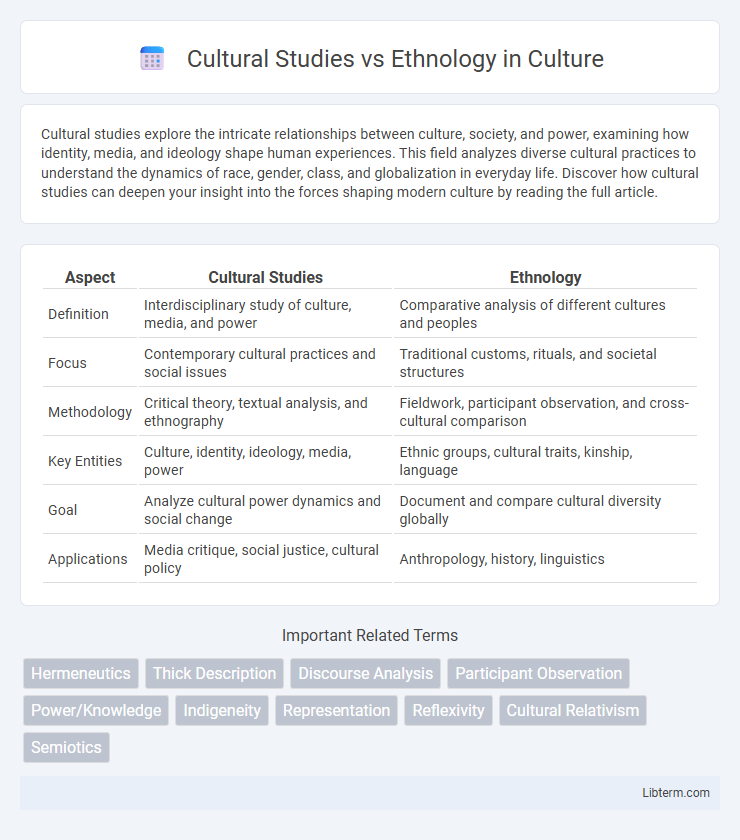Cultural studies explore the intricate relationships between culture, society, and power, examining how identity, media, and ideology shape human experiences. This field analyzes diverse cultural practices to understand the dynamics of race, gender, class, and globalization in everyday life. Discover how cultural studies can deepen your insight into the forces shaping modern culture by reading the full article.
Table of Comparison
| Aspect | Cultural Studies | Ethnology |
|---|---|---|
| Definition | Interdisciplinary study of culture, media, and power | Comparative analysis of different cultures and peoples |
| Focus | Contemporary cultural practices and social issues | Traditional customs, rituals, and societal structures |
| Methodology | Critical theory, textual analysis, and ethnography | Fieldwork, participant observation, and cross-cultural comparison |
| Key Entities | Culture, identity, ideology, media, power | Ethnic groups, cultural traits, kinship, language |
| Goal | Analyze cultural power dynamics and social change | Document and compare cultural diversity globally |
| Applications | Media critique, social justice, cultural policy | Anthropology, history, linguistics |
Defining Cultural Studies: Scope and Focus
Cultural Studies centers on analyzing cultural phenomena in contemporary societies, emphasizing power dynamics, identity, and media influence across global contexts. Its interdisciplinary scope integrates sociology, literature, and politics to explore how culture shapes and is shaped by social structures. Unlike Ethnology, which systematically compares traditional cultures through fieldwork and anthropological methods, Cultural Studies prioritizes critical theory to understand cultural practices within modern social power relations.
Ethnology Explained: Methods and Objectives
Ethnology systematically compares cultures using qualitative and quantitative methods such as participant observation, interviews, and cross-cultural analysis to identify patterns in human behavior and social organization. Objective goals include understanding cultural diversity, interpreting social practices, and developing theories about cultural change and continuity. This discipline emphasizes empirical fieldwork and aims to produce generalized knowledge about cultural phenomena across societies.
Historical Origins of Cultural Studies and Ethnology
Cultural Studies emerged in the mid-20th century, rooted in the British Birmingham School, emphasizing the analysis of contemporary culture, power relations, and media influence. Ethnology has older origins dating back to the 19th century, evolving from anthropology and focusing on the systematic comparison of different cultures via fieldwork and historical documentation. Both disciplines share an interest in culture but diverge in methodology and historical context, with Ethnology grounded in colonial-era exploration and Cultural Studies shaped by post-war social theory.
Key Theoretical Frameworks in Cultural Studies
Cultural Studies primarily employs frameworks such as Stuart Hall's Encoding/Decoding model, which analyzes how media messages are produced and interpreted within power structures, and Antonio Gramsci's theory of cultural hegemony, emphasizing the role of ideology in maintaining societal dominance. It also integrates poststructuralist theories like Judith Butler's performativity concept, exploring identity as a social construct shaped through discourse and practice. Ethnology, by contrast, is grounded in anthropological methods focusing on cultural relativism and participant observation to compare and classify cultures, whereas Cultural Studies critically interrogates culture through interdisciplinary approaches rooted in critical theory and media analysis.
Methodological Approaches in Ethnology
Ethnology employs comparative methodologies, analyzing cultural phenomena across different societies through fieldwork and participant observation to understand universal patterns and social structures. It relies heavily on qualitative data collection, including interviews and immersive experiences, to capture emic perspectives within specific ethnic groups. This approach contrasts with Cultural Studies' multidisciplinary frameworks, as ethnology prioritizes systematic, empirical methods to interpret cultural meaning and variation.
Cultural Studies vs Ethnology: Differences in Perspective
Cultural Studies examines contemporary culture through interdisciplinary approaches, focusing on power dynamics, ideology, and media influence, while Ethnology analyzes traditional societies by comparing cultural practices and social structures. Cultural Studies emphasizes critical theory and cultural production in modern contexts; Ethnology prioritizes fieldwork and ethnographic data to understand cultural variation. The differing perspectives reflect Cultural Studies' concern with cultural representation and resistance, contrasting with Ethnology's systematic classification and cross-cultural analysis.
Interdisciplinary Connections and Influences
Cultural Studies integrates perspectives from sociology, literature, media studies, and history to analyze power dynamics, identity, and cultural production, emphasizing contemporary social issues and popular culture. Ethnology, rooted in anthropology, focuses on comparative analysis of cultures through fieldwork and participant observation, establishing systematic classifications of cultural practices and social structures. Both disciplines intersect through shared interest in culture and society, influencing each other by combining qualitative methods and theoretical frameworks to deepen understanding of human behavior and cultural diversity.
Major Thinkers and Contributors in Both Fields
Cultural Studies draws heavily on the works of Stuart Hall, Raymond Williams, and Michel Foucault, who emphasized the interrelation of culture, power, and identity in society. Ethnology is shaped by early anthropologists like Bronislaw Malinowski, Franz Boas, and Claude Levi-Strauss, whose contributions centered on fieldwork, cultural relativism, and structural analysis of myths and social practices. Both fields engage deeply with concepts of culture but apply different methodologies, with Cultural Studies focusing on contemporary social dynamics and Ethnology on comparative analysis of cultural patterns.
Contemporary Applications and Relevance
Cultural Studies examines power dynamics, identity, and media influence in contemporary societies, applying critical theory to address issues like globalization, race, and gender. Ethnology focuses on comparative analysis of cultures through ethnographic methods, providing insights into social structures and traditions relevant to multicultural policy development and intercultural communication. Both disciplines contribute to understanding cultural diversity, informing education, social justice initiatives, and community engagement practices.
Future Trends: Evolving Boundaries and Integration
Cultural Studies and Ethnology are increasingly intersecting through digital ethnography and transnational cultural analysis, reflecting future trends of integration. Emerging methodologies emphasize interdisciplinary approaches combining qualitative insights with big data analytics for richer cultural understanding. The evolving boundaries highlight collaborative frameworks that blend critical theory with empirical research to address global cultural dynamics.
Cultural Studies Infographic

 libterm.com
libterm.com